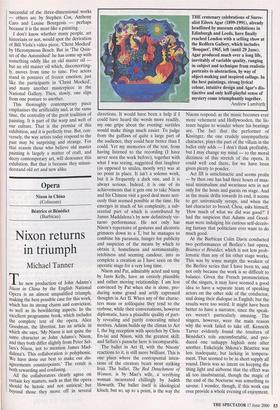Opera
Nixon returns in triumph
Michael Tanner
The new production of John Adams's Nixon in China by the English National Opera is an almost unqualified triumph, making the best possible case for this work, Which has its strong charm and conviction, as well as its bewildering aspects. In the excellent programme book, which includes the complete text of the opera, Alice Goodman, the librettist, has an article in Which she says, 'My Nixon is not quite the same character as John Adams's Nixon, and they both differ slightly from Peter Sel- lars's Nixon, not to mention James Mad- dalena's. This collaboration is polyphonic. We have done our best to make our dis- agreements counterpoints.' The result is both rewarding and confusing. All the collaborators clearly agree on certain key matters, such as that the opera Should be heroic and not satirical; but beyond those they move off in several directions. It would have been a help if I could have heard the words more readily, my one gripe about the evening: surtitles would make things much easier. To judge from the guffaws of quite a large part of the audience, they could hear better than I could. Yet my memories of the text, from having listened to the recording (I have never seen the work before), together with what I was seeing, suggested that laughter (as opposed to smiles, mostly wry) was at no point in place. It isn't a solemn work, but it is frequently a dark one, and it is always serious. Indeed, it is one of its achievements that it gets one to take Nixon and his Chinese visit a good deal more seri- ously than seemed possible at the time. He emerges in much of his complexity, a sub- stantial part of which is contributed by James Maddalena's by now definitively vir- tuoso performance. He not only has Nixon's repertoire of gestures and aleatoric grimaces down to a T, but he manages to combine his paranoia, hunger for publicity and suspicion of the means by which to obtain it, homeliness and sentimentality, tetchiness and seeming candour, into as complete a creation as I have seen on the operatic stage for a very long time.
Nixon and Pat, admirably acted and sung by Janis Kelly, have an entirely plausible and rather moving relationship. I am less convinced by Pat when she is alone, pro- ducing some grand and artily expressed thoughts in Act II. When any of the charac- ters muse or soliloquise they tend to the verbose, while their conversations, however diplomatic, have a plausible quality of part- ly revealing and partly concealing mixed motives. Adams builds up the climax to Act I, the big reception with speeches by Chou En-lai and Nixon, with the greatest skill; and Sellars's panache here is incomparable.
The ballet in Act II, with the Nixons' reactions to it, is still more brilliant. This is one place where the contrapuntal inten- tions of the creators bears most striking fruit. The ballet, The Red Detachment of Women, is by Mao's wife, a terrifying woman incarnated chillingly by Judith Howarth. The ballet itself is ideological kitsch, but so, up to a point, is the way the Nixons respond: as the music becomes ever more vehement and Hollywooden, the lis- tener begins to wonder where his bearings are. The fact that the performer of Kissinger, the one crudely unsympathetic character, plays the part of the villain in the ballet only adds — I don't think profitably, but I may change my mind — to the moral dizziness of this stretch of the opera. It could well end there, for we have been given plenty to ponder.
Act III is anticlimactic and seems prolix — by then one has had three hours of max- imal minimalism and weariness sets in not only for the hosts and guests on stage. And as the music drifts towards its end, it seems to get unironically syrupy, and when the last character to brood, Chou, asks himself, 'How much of what we did was good?' I had the suspicion that Adams and Good- man were indulging his curious self-deceiv- ing fantasy that politicians ever want to do much good.
At the Barbican Colin Davis conducted two performances of Berlioz's last opera, Beatrice et Benedict, which is not less prob- lematic than any of his other stage works. This was by some margin the weakest of the Berlioz series that I have been to, and not only because the work is so difficult to balance. Given the French pronunciation of the singers, it may have seemed a good idea to have a separate team of speaking actors on the other side of the conductor, and doing their dialogue in English; but the results were too weird. It might have been better to have a narrator, since the speak- ers weren't particularly amusing. The singers, however, were the main reason why the work failed to take off. Kenneth Tarsier evidently found the tessitura of Benedict's role uncomfortable, and pro- duced one unhappy highish note after another. Enkelejda Shkosa's Beatrice was less inadequate, but lacking in tempera- ment. That seemed to be in short supply all round. Davis was so intent on keeping the thing light and airborne that the effect was all too insubstantial, though the magic of the end of the Nocturne was something to savour. I wonder, though, if this work can ever provide a whole evening of enjoyment.










































































 Previous page
Previous page